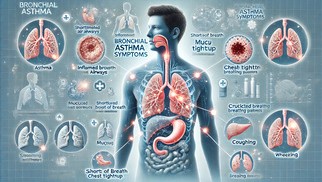Bronchial Asthma: Understanding, Treating, and Managing the Condition


Bronchial asthma, commonly known as asthma, is a chronic respiratory condition affecting the airways, characterized by inflammation, narrowing, and excess mucus production. These changes result in difficulty breathing, persistent coughing, wheezing, and chest tightness. Triggers like allergens, infections, exercise, or environmental irritants often exacerbate symptoms.
In 2025, asthma affects millions of people worldwide, particularly children and adults with a family history of allergic diseases. Despite its chronic nature, advancements in medication and treatment strategies have greatly improved symptom control and quality of life for patients. Key approaches include identifying the condition's specifics, recognizing differences between asthma and other bronchial diseases, and understanding medication like Advair Diskus for long-term management.
How Do You Treat an Asthma Cough?
Persistent coughing is one of the primary symptoms of asthma, particularly at night or early morning. Unlike a productive cough caused by infections, an asthma cough is often dry and caused by airway inflammation. Treatment focuses on calming the underlying inflammation and preventing airway constriction.
Common approaches include using fast-acting bronchodilators to relax airway muscles, corticosteroids to reduce inflammation, and hydration to soothe the throat. Avoiding specific triggers like pollen, animal dander, smoke, or dust is essential. Asthma patients often benefit from personalized plans developed by their healthcare providers, ensuring both immediate relief and long-term control.
What is the Difference Between Asthma and Bronchial?
Asthma and bronchial conditions, particularly bronchitis, are often mistakenly thought to be similar due to overlapping symptoms such as coughing and difficulty breathing. However, these two conditions are distinct in their causes, underlying mechanisms, and treatments. Understanding these differences is critical for accurate diagnosis and effective management.
Bronchitis typically refers to the inflammation of the bronchial tubes, which are the airways that carry air to and from the lungs. It is often caused by respiratory infections, particularly viruses like the common cold or flu, or environmental irritants such as tobacco smoke, pollution, or chemical fumes. Bronchitis can be acute or chronic. Acute bronchitis is temporary and usually resolves on its own within a few weeks, while chronic bronchitis is a long-term condition often associated with smoking or other prolonged exposure to irritants. Symptoms include a persistent, productive (wet) cough that brings up mucus, chest discomfort, and sometimes fever or fatigue.
Asthma, on the other hand, is a chronic inflammatory condition of the airways driven by the immune system. It causes the airways to become hypersensitive, leading to recurrent episodes of wheezing, breathlessness, and a dry, persistent cough. Unlike bronchitis, the airway constriction in asthma is often triggered by allergens (pollen, pet dander), environmental factors (cold air, exercise), or even emotional stress. This narrowing of the airways in asthma is typically reversible with proper treatment, such as bronchodilators and corticosteroids.
The key difference lies in the underlying cause. While bronchitis is often caused by infection or irritants, asthma is an immune-mediated condition. Importantly, the treatments for these conditions differ significantly. Misdiagnosing asthma as bronchitis or vice versa can lead to inappropriate therapies, such as unnecessary antibiotics for asthma, which do not address its immune-driven nature.
Recognizing these distinctions allows healthcare providers to develop a targeted approach, ensuring patients receive appropriate treatment and management tailored to their specific condition. For example, an asthmatic patient requires long-term control strategies, while a person with acute bronchitis may only need supportive care for symptom relief. This differentiation not only improves patient outcomes but also reduces the risk of complications.
What is the Best Treatment for Asthmatic Bronchitis?
Asthmatic bronchitis occurs when someone with asthma develops acute bronchial inflammation due to infection or irritants. This combination exacerbates asthma symptoms, making it difficult to breathe. Treatment aims to address both the infection and the underlying asthma.
Patients often rely on corticosteroids to manage airway inflammation and bronchodilators to relieve acute symptoms. If the bronchitis is bacterial, antibiotics may be necessary. Alongside medication, adequate hydration helps thin mucus for easier clearance, and rest is vital for recovery. For asthmatic bronchitis, it’s particularly important to follow a doctor-prescribed action plan to avoid complications.
Treatment with Advair Diskus
Advair Diskus is one of the most widely prescribed medications for managing bronchial asthma. It is a combination of two active ingredients: fluticasone, a corticosteroid, and salmeterol, a long-acting beta-agonist (LABA). This dual-action treatment addresses both the inflammation and airway constriction that are hallmark features of asthma. The inhaler delivers a fixed dose of these medications, helping patients achieve consistent symptom control with regular use.
The corticosteroid component, fluticasone, reduces airway swelling by suppressing the inflammatory process responsible for asthma symptoms. Its long-term use minimizes exacerbations and improves lung function. The LABA component, salmeterol, works as a bronchodilator, relaxing airway muscles to prevent bronchospasm and reduce wheezing and tightness in the chest. The combined effects provide both immediate symptom relief and ongoing prevention, making Advair Diskus a cornerstone therapy for moderate to severe asthma.
Advair Diskus is typically prescribed for twice-daily use, allowing sustained control over a 24-hour period. However, it is not intended for acute symptom relief during asthma attacks; a fast-acting bronchodilator like albuterol should be used in such cases. Adherence to Advair Diskus therapy can significantly reduce the frequency of asthma attacks, hospitalizations, and the need for rescue medications.
Patients need to use the inhaler properly to maximize its benefits. A common error involves not inhaling the medication deeply enough, reducing its effectiveness. Proper training from a healthcare provider ensures the medication reaches the lungs rather than staying in the mouth or throat. Like all medications, Advair Diskus carries potential side effects, including oral thrush, which can be minimized by rinsing the mouth after use.
For many, Advair Diskus represents a reliable option for achieving asthma control and enjoying an improved quality of life. Its ability to address the condition's underlying mechanisms sets it apart, ensuring comprehensive treatment for long-term asthma management.
What is the Best Treatment for Asthma?
The most effective asthma treatment plans address both immediate relief and long-term control. Short-acting bronchodilators, such as albuterol, provide quick relief during asthma attacks by relaxing airway muscles and allowing easier breathing. For persistent asthma, inhaled corticosteroids remain the gold standard, reducing chronic inflammation. These may be supplemented with LABAs or leukotriene receptor antagonists for comprehensive symptom control.
In severe cases, newer biologic medications like omalizumab or dupilumab have shown exceptional promise by targeting specific immune pathways involved in asthma. Lifestyle changes, such as minimizing exposure to allergens and maintaining regular exercise routines, complement medical treatment and help patients lead fulfilling lives.
Living with Bronchial Asthma
Living with asthma requires a combination of education, adherence to prescribed therapies, and awareness of triggers. With modern treatments like Advair Diskus, many patients can achieve effective symptom control and improved quality of life. Collaborating with healthcare professionals, maintaining a clean environment, and staying proactive in managing symptoms ensures a healthier, less interrupted life.
Asthma may not have a cure, but with continued advancements in medical science, the outlook for patients has never been better.
Medically Reviewed by Dr. Faride Ramos, MD
(Updated at Jan 8 / 2025)